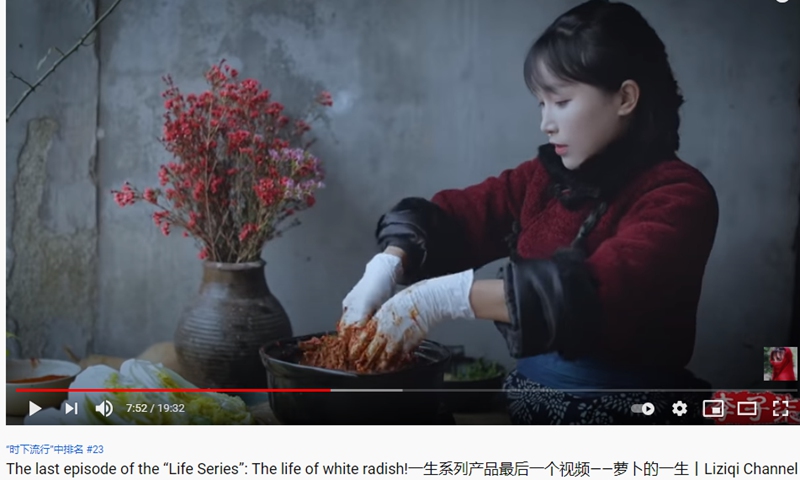
Photo: A screenshot from Li Ziqi YouTube account
A cultural spat between Chinese and South Korean netizens roared again after Chinese food vlogger Li Ziqi released a video on YouTube of herself making Kimchi.
Li, who has 14 million followers on YouTube, posted a 20-minute YouTube video on December 9, in which she showed how she made Kimchi.
The video reignited a prolonged cultural clash between Chinese and South Korean netizens over the origin of kimchi since the end of last year.
Some South Korean netizens commented on the video by saying that kimchi is a Korean dish and blaming Chinese, like Li, for "stealing" the culture and traditions from South Korea, igniting wide criticism and mockery from Chinese netizens.
The argument also expanded to a video released a month ago by Li that shows herself making dried persimmons.
"Dried persimmon is also Korean food," a netizen commented.
"I love Korean food gotgam [dried persimmon]," another said.
Such comments sparked wide criticism among some Chinese netizens.
"I have been eating persimmon in China for more than 20 years. When did it become Korean exclusive food? When did it become an exclusive culture of South Korea?" a netizen said.
Such clashes reflect deep and close cultural ties between the two countries, which have been carried on in mutual exchanges for thousands of years, experts said.
"Bilateral exchanges in many areas, like food, agricultural technology and medicine, between China and South Korea have been so close in history, that it is very normal that both sides have something in common," Zhang Yiwu, a professor from Peking University, told the Global Times.
In history, China developed relatively early and had some influence and output on other societies in East Asia in multiple aspects, while other places in the area also made their own unique creations, which together have enriched the development of East Asia, Zhang noted.
Zhang said that such imbroglios among Chinese and South Korean people are "not necessary," and called for people to view each other's cultures with an open mind.
In early December, a China-led application to the International Organization for Standardization of paocai, the Chinese version of pickled cabbage, started the feud. Protectors of kimchi culture on South Korean social media accused China of attempting to "steal the culture." Chinese netizens responded with mockery and criticism.
Chinese Foreign Ministry Spokesperson Hua Chunying emphasized at a press conference on December 1 that cooperation and shared benefits between China and South Korea surely overweigh disagreements on kimchi's origin.
The Global Times found that such an accusation was vague and untenable. The NSFC is responsible for directing and coordinating the national natural science fund to support basic research, and for identifying and fostering scientific talent. It is also responsible for promoting international cooperation. The foundation rarely publishes specific science studies on its website.




